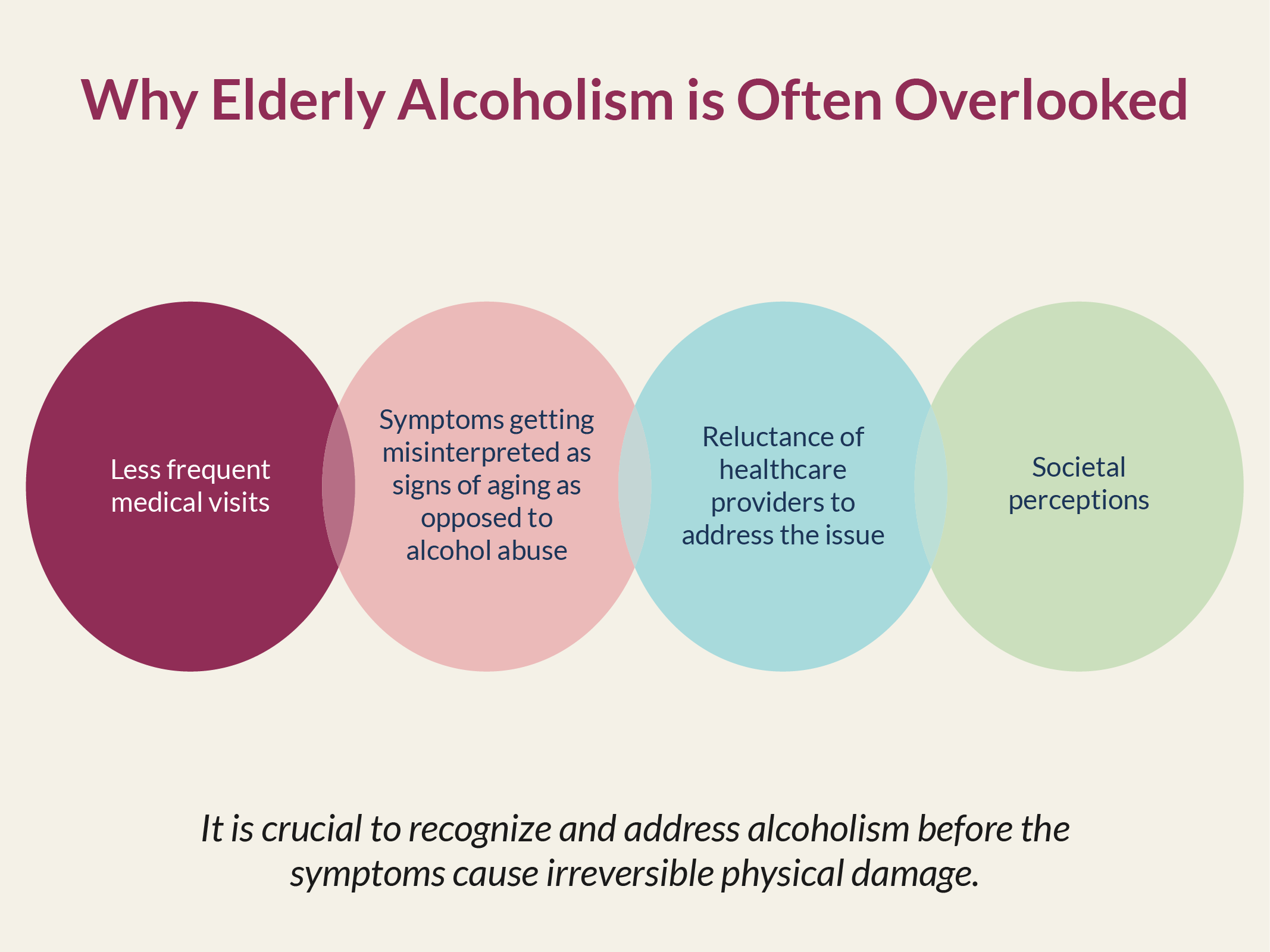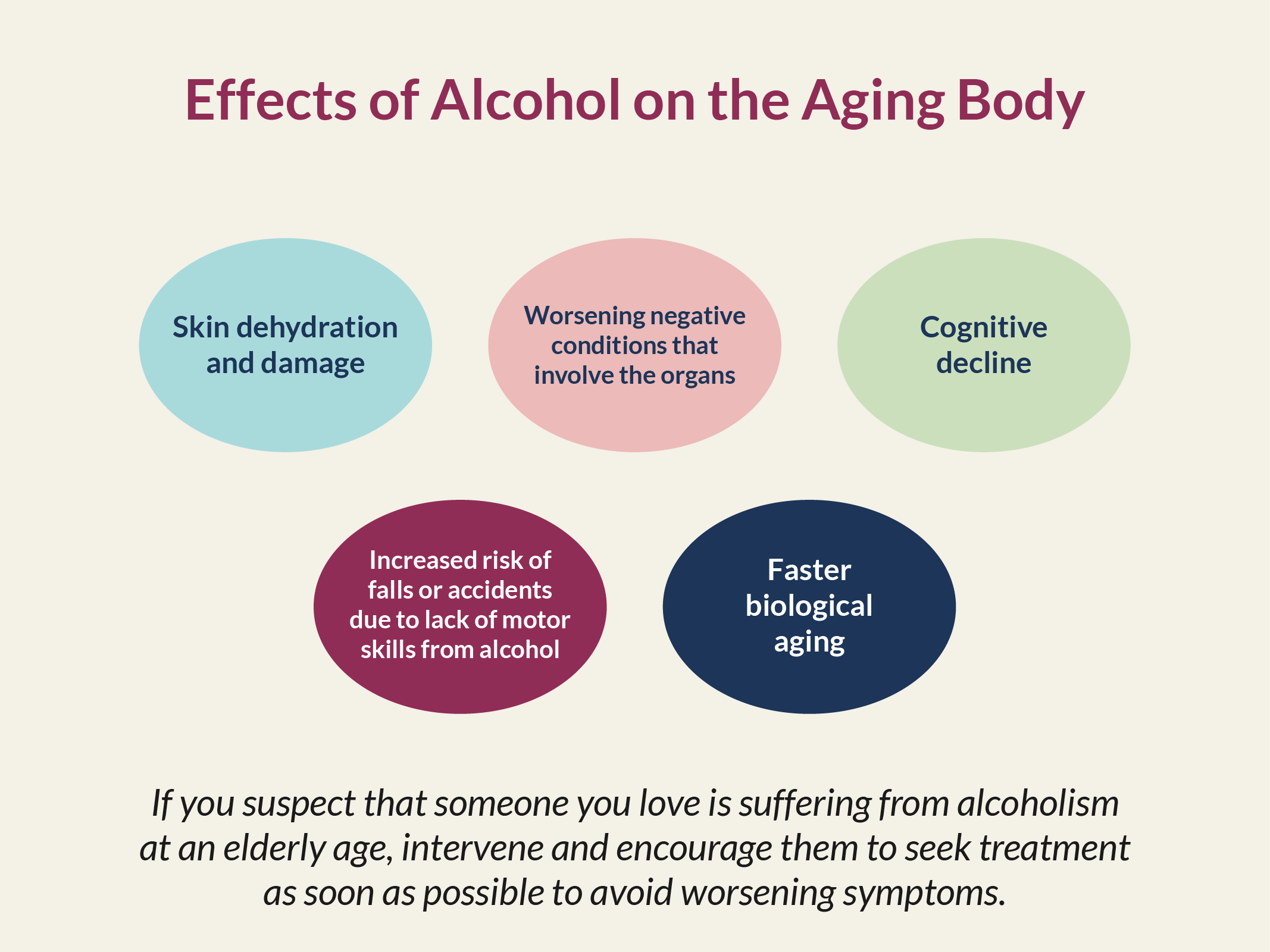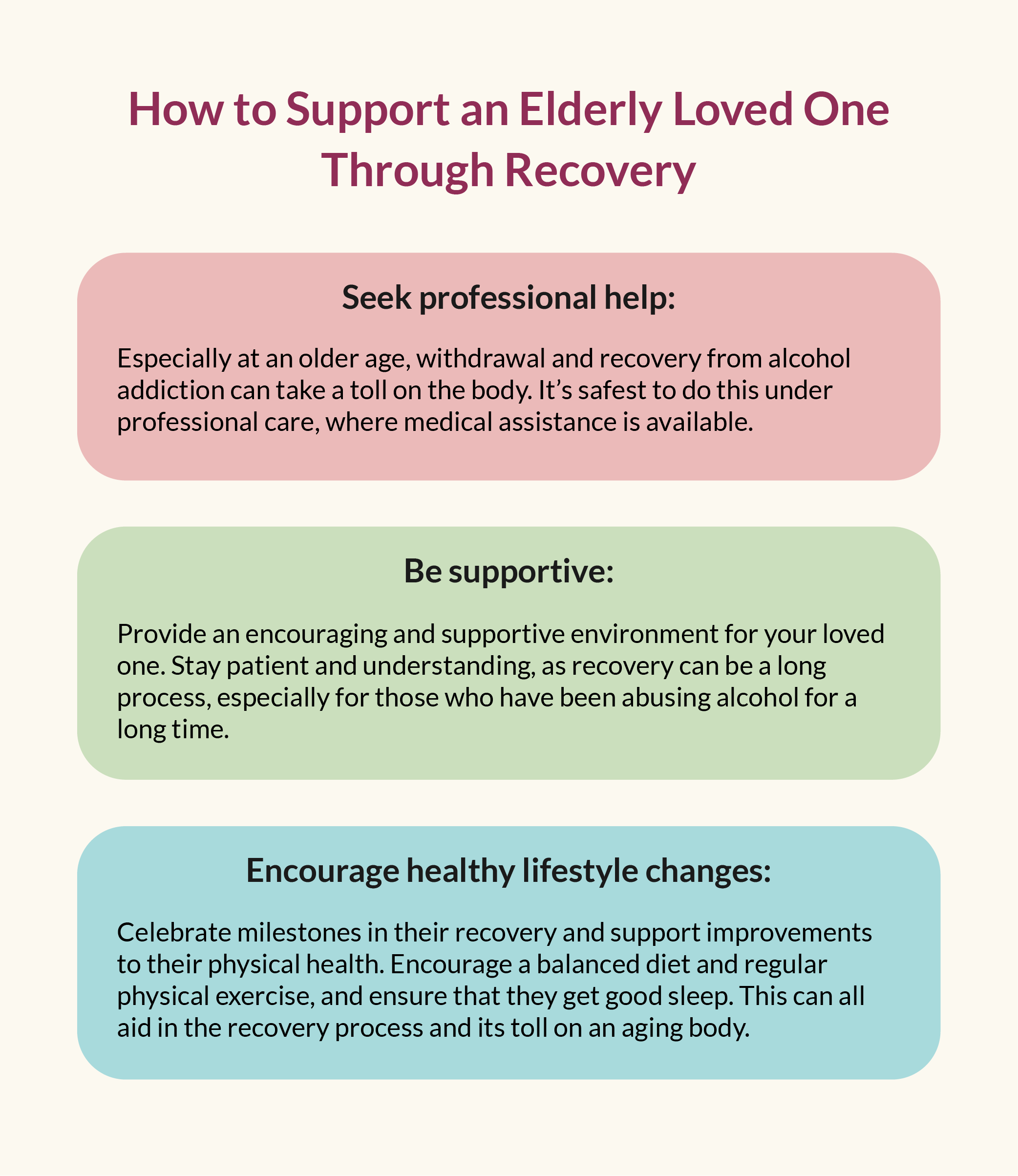Alcohol abuse does not stop at a certain age. Even the elderly population in the U.S. can be susceptible to alcoholism. A reported 2.7 million people aged 65 and up suffer from alcohol use disorder (AUD). As people age and their bodies change, the effects of alcohol can put individuals at a greater risk of negative health impacts. For elderly alcoholics, the health implications from alcohol abuse can even be fatal.
Why Elderly Alcoholism Is Often Overlooked

Elderly alcoholism is often underreported and underrecognized. There are a wide number of factors that could cause this population to be overlooked including:
- Less frequent medical visits
- Symptoms getting misinterpreted as signs of aging as opposed to alcohol abuse
- Reluctance of healthcare providers to address the issue
- Societal perceptions
Recognizing the serious signs of alcohol abuse in the elderly population can protect those who suffer from alcoholism from worsening health risks. At an older age, these health risks can progress faster, making it crucial to recognize and address alcoholism before the symptoms cause irreversible physical damage.
Risk Factors for Alcohol Abuse in Seniors
As the body ages, it has a lower tolerance for alcohol. Especially in senior ages of 65 and up, the body continues to weaken, making it less protective against the negative effects of alcohol. To make matters worse, alcohol abuse in the elderly could have started at a younger age, meaning that they are more likely to experience the long-term effects of alcohol, as opposed to just the short term ones.
Drinking is already known to damage the body. As we age, that damage can be at a much greater scale. For example, the immune system weakens as you grow older. Someone over the age of 65 may have even worse trouble with their immune system due to alcohol addiction, which also weakens the immune system. Illnesses can cause a greater impact on the body that someone with a stronger immune system, even for things like the common cold or flu.
Effects of Alcohol on the Aging Body
Alcohol has a greater impact on the aging body and can even accelerate aging in the body. Some effects of alcohol on the aging body include:
- Skin dehydration and damage
- Worsening negative conditions that involve the organs (liver disease, heart disease, diabetes, etc.)
- Cognitive decline
- Increased risk of falls or accidents due to lack of motor skills from alcohol
- Faster biological aging
As someone gets older, their body becomes more and more fragile. The weakening of the immune system, changes to muscle and bone density, fatigue, worsening health conditions, osteoarthritis, and more can all be impacted heavier by drinking. If you suspect that someone you love is suffering from alcoholism at an elderly age, intervene and encourage them to seek treatment as soon as possible to avoid worsening symptoms.

Warning Signs of Alcoholism in the Elderly
Warning signs of alcoholism in the elderly can appear in anything from behavioral changes to physical signs, including:
- Increased secrecy in drinking habits
- Isolation
- Neglecting responsibilities
- Changes in mood, irritability, or depression
- Memory problems
- Frequent falls or injuries
- Unexplained bruising
- Poor coordination
- Changes to sleep patterns
- Frequent nausea or gastrointestinal issues
- Worsening chronic health problems
- Withdrawal from loved ones
- Denial of drinking problems
Any warning signs of alcoholism in a loved one should be taken seriously. There are plenty of resources for alcohol addiction available. Behavioral Health Centers also offers a detox program in addition to outpatient and inpatient treatment programs.
Treatment Challenges for Elderly Adults
Treating alcohol addiction in adults aged 65 and older presents unique challenges due to a combination of medical, psychological, and social factors. Many elderly individuals face chronic health conditions, slower metabolism, and multiple medications, which can complicate detox and treatment. Cognitive impairments, such as memory loss or dementia, may affect their ability to fully participate in therapy, and alcohol use can exacerbate these issues. Additionally, elderly individuals often experience feelings of depression, loneliness, or grief, which can act as triggers for alcohol use, and may be less likely to seek help due to the stigma associated with addiction.
Logistical challenges also play a significant role in treatment, as access to age-appropriate treatment can be limited. Mobility issues or social isolation can make it difficult for older adults to attend outpatient programs or other treatment programs. Furthermore, healthcare providers may overlook alcohol use when focusing on other medical concerns, and elderly patients may resist treatment due to a lifetime of habits. To address these challenges, the chosen treatment program must be able to handle elderly patients, integrating medical care and providing a supportive, non-confrontational environment that emphasizes relationship-building and involves family or caregivers whenever possible.
Do Elderly Patients Withdraw from Alcohol More Rapidly?
Elderly patients often experience alcohol withdrawal more slowly and with greater risk compared to younger adults, but the process can still be serious. While younger individuals may exhibit more immediate and intense symptoms, older adults tend to have a slower metabolic rate, meaning alcohol may stay in their system longer, leading to a prolonged withdrawal process. This slow process can increase the risk of complications, such as delirium tremens (DTs), seizures, or cardiovascular instability. Additionally, the presence of chronic medical conditions and cognitive impairments in older adults can exacerbate these withdrawal symptoms.
Older individuals also have decreased liver function, which can affect how alcohol is metabolized and make it harder for their body to clear alcohol from their system. This, combined with the fact that elderly adults may be on multiple medications that interact with alcohol and withdrawal medications, increases the risk of severe reactions during detox. Therefore, withdrawal in elderly patients often requires careful medical supervision, a slow tapering process, and individualized care to safely manage symptoms and prevent life-threatening complications.
How to Support an Elderly Loved One Through Recovery
There are plenty of ways to support an elderly loved one through the recovery from alcohol addiction including:
- Seek professional help: especially at an older age, withdrawal and recovery from alcohol addiction can take a toll on the body. It’s safest to do this under professional care, where medical assistance is available.
- Be supportive: Provide an encouraging and supportive environment for your loved one. Stay patient and understanding, as recovery can be a long process, especially for those who have been abusing alcohol for a long time.
Encourage healthy lifestyle changes: Celebrate milestones in their recovery and support improvements to their physical health. Encourage a balanced diet and regular physical exercise, and ensure that they get good sleep. This can all aid in the recovery process and its toll on an aging body.










